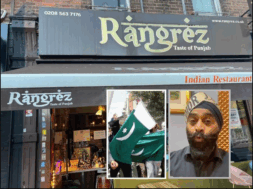
Roving Periscope: Pakistan ’s revamped “counter-terror” move draws popular protests!
Virendra Pandit
New Delhi: Days after its launch with much fanfare—of course, under pressure from an angry China!-Pakistan’s revamped “anti-terror” campaign is facing stiff opposition from the terror outfits as well as the political Opposition, the media reported on Wednesday.
Not only tribal councils but Opposition parties have also protested against the relaunch of a “counter-terror” drive, now known as Azm-i-Istehkam, claiming it will weaken the country instead of securing it.
Between January and March this year alone, Pakistan has witnessed nearly 250 terror attacks and “counter-terror” operations in various provinces. In some of these, the terrorists gunned down several Chinese personnel working on various projects of the USD 62 billion China-Pakistan Economic Corridor (CPEC).
Recently, an angry Beijing returned empty-handed the visiting Prime Minister Shehbaz Sharif and Army chief Asim Munir who had gone there to seek funds. A senior visiting Chinese official also made it clear to Islamabad that any Chinese investments in Pakistan depended on the “stability” in the South Asian country.
These tough talks by Pakistan’s “all-weather friend” forced Islamabad to announce its counter-terror campaign last week. But the move immediately ran into trouble from within the country.
The Opposition parties’ rallies and ‘jirgas’ (tribal councils) were held in various cities of the Pakistani province of Khyber Pakhtunkhwa (KP) on Sunday to protest the proposed military operation against homegrown terrorists, even after Islamabad clarified last week that the campaign would not be a large-scale, kinetic military operation, nor cause mass displacement of local populations.
Pakistani media outlet Dawn said on Monday that youth activists, who took out a motorcycle rally against any possible military offensive, were seen holding placards inscribed with slogans for peace and white flags. They said the people of Khyber Pakhtunkhwa had been hit hard by both the militancy and the military operations meant to counter it. Thousands of militancy-hit families were still living in miserable conditions and military operations always displaced a large number of people.
People attending these rallies and councils included tribal elders, youths, and political activists. According to Dawn, protestors in some parts of the KP province also said that terrorists had targeted several policemen and elders in the last couple of years.
But most of them rejected counter-terror military operations in the region and asked the authorities to instead focus on targeted and intelligence-based operations against militants. Even the Islamist political party Jamaat-i-Islami organized such a rally.
Sunday’s protests came despite official clarification last week that the campaign would neither be a large-scale and kinetic military operation nor would it cause mass displacement.
On the government’s clarification, Dawn said that it came after intense criticism from Pakistan’s Opposition parties, which complained that the government announced the plans to launch military action without consulting parliament.
Announced on June 22, a “reinvigorated and re-energized” nationwide counter-terrorism campaign originally envisaged the kinetic efforts of the Pakistani armed forces, with support from the country’s law enforcement agencies, and bringing in effective legislation to address legal gaps that hindered effective prosecution of terrorism-related cases in the past.
The Pakistani PM’s Office, while trying to address the Opposition’s misgivings, admitted that previous kinetic military operations carried out to “physically dislodge terrorists from their known locations” that had become no-go areas, had “required mass displacement of the local population.”
Since there were no such no-go areas left in Pakistan and terrorists’ ability to conduct large-scale organized operations had been “decisively degraded by earlier kinetic operations,” no major military operation was now being contemplated that would require displacement of the population.
The proposed operation would “energize” intelligence-based operations to root out terrorists, violent extremism, and the crime-terror nexus in Pakistan, it said.
Despite these assurances, Dawn reported that the planned campaign has met with sharp criticism from Opposition parties, including the Pakistan Tehreek-e-Insaf (PTI), Jamiat Ulema-i-Islam (JUI-Fazl) and the Awami National Party (ANP).
KP Chief Minister Ali Amin Gandapur complained that the planned campaign was not discussed with him at all.
JUI-Fazl chief Maulana Fazl said that the decision to conduct the planned operation would “weaken” Pakistan. The ANP said it would not support the proposed operation unless its reservations were addressed.
ANP’s KP President Mian Iftikhar Hussain said the situation in Pakistan had reached a point where people “do not trust in negotiations as well as operations against militants anymore.” He claimed that after a previous round of negotiations, conducted under a former intelligence chief, the militants had taken over which led to the displacement of people.
Moreover, he said, the terror masterminds were located in Pakistani Punjab. Around 70 banned organizations had resurfaced with different names, and if the government needed to start an operation, it should start with them.
Despite the Pakistani government’s claims that the counter-terror drive would not involve a large-scale military operation, Pakistan’s envoy to the US, Masood Khan, urged Washington last week to provide small arms and modern equipment to his country to ensure the operation’s success.
According to Dawn, while addressing US policymakers at a Washington think tank, Ambassador Khan said, “Pakistan has launched ‘Azmi-Istehkam’ to oppose and dismantle terrorist networks. For that, we need sophisticated small arms and communication equipment.”














